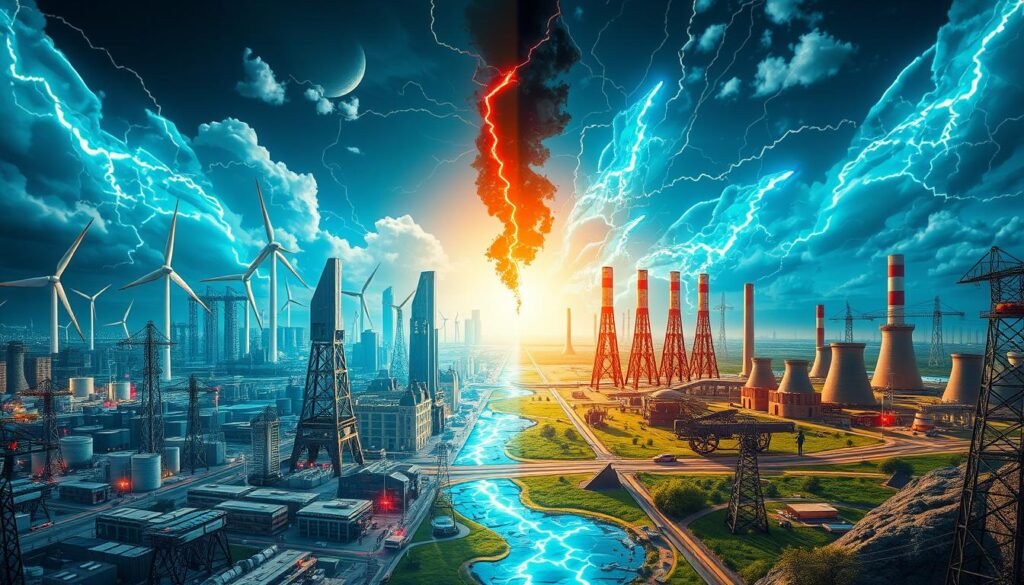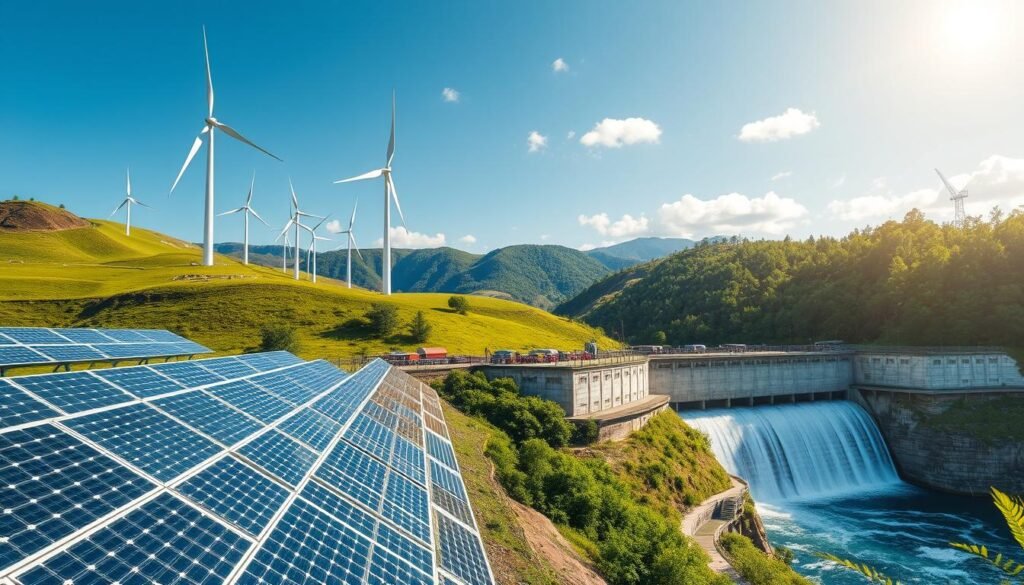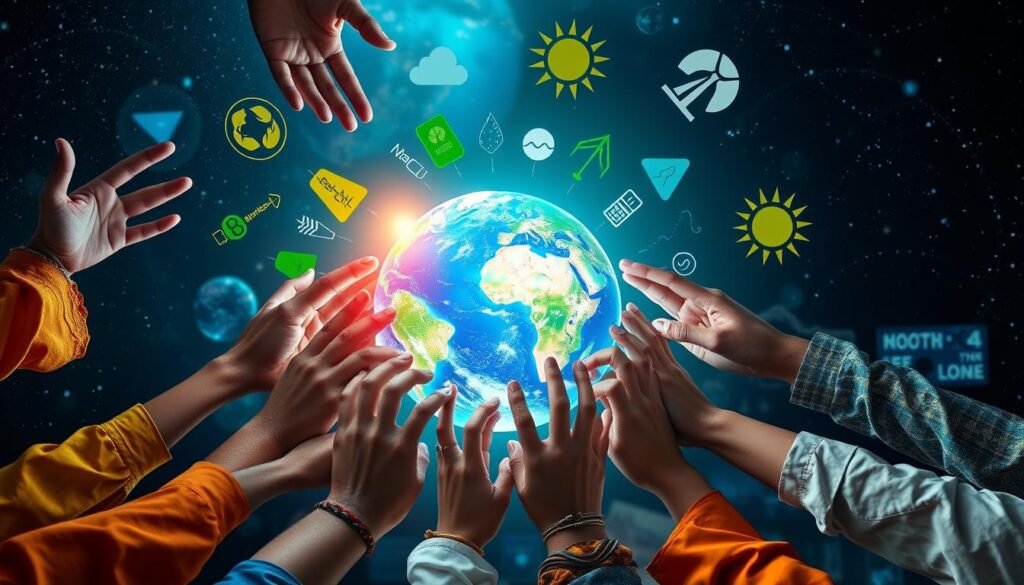The world’s need for resources is growing fast, thanks to economic growth, more people, and new tech. This has made getting energy resources a big challenge worldwide. With the global population set to hit 9.6 billion by 2050, and the world’s economy expected to triple by then, finding reliable and sustainable energy is key.
Regions in Asia are using more resources as they grow, making the fight for energy even tougher. The link between economic growth and using resources is complex. While richer countries use fewer resources, they still use a lot. If poorer areas use resources like them, the world could face huge energy demands.
This fight for energy, along with worries about energy security and the need for renewable energy, affects the global economy, how countries work together, and the planet’s health.
Key Takeaways : Resource Competition?
- Global demand for resources has increased significantly due to economic development, population growth, and technological advances.
- Developing regions, particularly in Asia, are accounting for a growing proportion of global resource consumption, intensifying the competition for energy resources.
- The relationship between economic growth and resource use is complex, with evidence suggesting that resource intensity tends to decrease as countries reach higher income levels.
- Advanced economies remain highly resource-intensive, and if developing regions adopt similar systems of production and consumption, the implications for global energy demand could be profound.
- The intensifying competition for energy resources, coupled with concerns over energy security, geopolitical tensions, and the need for a transition to renewable energy sources, has significant implications for the global economy, international cooperation, and environmental sustainability.
Drivers and Trends of Global Resource Demand
The world’s need for resources has grown a lot, almost ten times since 1900. This growth is due to more people, economic growth, and new technology.
Intensifying Global Demand
More resources are being used every year. The growth rate has increased from 1.3% in the early 1900s to 3.6% in the 2000s. Asia is now using more resources, going from 41% to 57% of the total in thirty years.
As countries get richer, they use more resources. But, this use often slows down or stops as they get even richer.
Uncertain Access to Critical Resources
Many resources are found in just a few countries, giving them a lot of power over prices and supplies. This can be a problem if these countries are unstable. The European Commission has listed twenty critical raw materials that could be in short supply soon.
| Resource | Geographic Concentration | Supply Risk |
|---|---|---|
| Rare Earth Elements | China (95% of global production) | High |
| Platinum Group Metals | South Africa (90% of global production) | High |
| Chromium | South Africa, Kazakhstan, India (90% of global production) | Medium |
Countries are looking for new sources of resources because they worry about supply. But, new technology has helped find more fossil fuels, like oil and gas.
With more people and growing economies, the need for resources will keep going up. This will make it hard to keep resources safe, share them fairly, and use them in a sustainable way.
Energy’s Role in Resource Competition
Energy is key to global economic growth. It powers our transportation, industries, buildings, and more. Cities, which make up most of a country’s economy, use a lot of energy. This shows how vital energy is for our economy and well-being.
Significance of Energy for Economic Development
Having a steady energy supply is crucial for today’s economies. Energy competition, energy geopolitics, and energy security are big issues for countries. They want to grow their economies and manage their energy well.
Fossil Fuel Dependence and Its Challenges
Fossil fuels make up 81.3% of the world’s energy. This leads to big problems like more greenhouse gas emissions and pollution. It also causes energy supply disputes and energy trade wars because of energy shortages.
We rely too much on limited fossil fuels. This makes us dependent on them and at risk of energy crises. Managing energy resources and having strategic energy reserves is key in the energy market competition. This is especially true for oil competition and natural gas rivalry.
It’s hard for governments to fix market prices and cut down on greenhouse gases. Businesses and consumers often oppose these efforts. This could slow down the move to cleaner energy alternatives and increase harmful emissions.
“The widespread use of fossil fuels, which account for 81.3% of global energy supply, causes a number of challenges, including rising greenhouse gas emissions, pollution, and supply disruptions.”
Strategies for Sustainable and Secure Energy Access
Cities are moving away from fossil fuels to meet growing energy demands. The renewable energy race is underway, with new tech in wind, solar, and geothermal offering hope. These solutions aim to lessen the harm from energy production.
Transitioning to Renewable Energy Sources
Renewable energy investments are growing, but challenges remain. The supply can be unpredictable, and costs are high. Cities need new strategies to use wind, solar, and other sources together. They should also use waste and heat to make energy more reliable.
Improving Energy Efficiency and Smart Grid Technology
It’s important to use less energy, not just switch to new sources. Smart grid technology helps manage energy by balancing supply and demand. It also cuts down on energy loss during transport.
Building efficiency, urban farming, and reducing food and water waste help too. These steps boost energy conservation and energy optimization. They make energy use more sustainable.
Governments must push for laws and incentives for green tech. By managing energy resource allocation and dealing with nuclear energy competition, cities can ensure a secure energy future.
“The less energy that is used, the less needs to be produced. Technology can assist in optimizing energy use, with smart grids paired with smart appliances or even a whole smart home or building responding to varying electricity supply and prices.”
Resource Competition and International Cooperation
As the world faces more resource competition, getting to essential resources is a big worry for many countries. Fluctuating energy prices and resource scarcity threaten the economy and quality of life globally. Trying to get resources can lead to energy conflicts and tensions between nations, caused by disputes over resources or trade restrictions.
To tackle these issues, governments should work together with local and international partners. This helps local companies grow their knowledge, skills, and market presence. It also boosts energy security and supports sustainable use of resources. Public-private partnerships are key in building energy systems, since the costs are often too high for one country alone.
Using decentralized energy systems and custom infrastructure can help cities adjust to their unique needs. It also encourages the use of green energy sources. By working together and trying new ideas, countries can handle the tough challenges of resource competition. This ensures everyone gets fair and safe access to vital resources.
“Collaborative efforts between local and international partners can enable local companies to strengthen their knowledge, expertise, and market reach, fostering energy security and promoting sustainable resource management.”
Also Read : Geopolitical Alliances and Agreements: Global Powers Unite
Conclusion
Global competition for resources makes energy key to economic growth, politics, and the environment. As more people move to cities and use more energy, finding enough energy safely and sustainably gets harder.
Most of the world uses fossil fuels for over 80% of its energy. This makes us dependent on resources that are running out and can be hard to get. This has led to fights over energy, trade wars, and tensions between countries. Using fossil fuels also harms the planet by releasing harmful gases and using up resources too fast.
To solve these problems, we need to use more renewable energy, use energy better, and work together with other countries. Investing in new energy technologies and better energy storage can make our energy use more secure. At the same time, making buildings, cars, and factories use less energy can help use less natural resources.
FAQs
Q:What are the key drivers of global resource demand?
Since the 20th century, global resource demand has grown a lot. This is due to economic growth, more people, and new technology. These factors have made the economy 25 times bigger and the population four times larger.
By 2050, the population might grow by over a third to 9.6 billion. And, the world’s economy could triple from 2010 to 2050.
Q:How is the geographic concentration of resource reserves a concern?
Many reserves are in just a few countries, giving suppliers a lot of power over prices and supplies. This can lead to problems if these areas are unstable. The European Commission has listed twenty critical raw materials due to supply risks and their importance.
These materials are mainly produced in a few places, making their supply uncertain.
Q:What is the significance of energy for economic development?
Energy is key for economic growth. It powers transport, industries, and many other activities. Cities are the heart of economies, making up over 75 percent of a country’s GDP.
They need a steady energy supply, using about 75 percent of the world’s energy.
Q:What are the challenges associated with the current reliance on fossil fuels?
Using fossil fuels, which make up 81.3% of energy, has many problems. These include high greenhouse gas emissions, pollution, and supply issues. Relying too much on these fuels can disrupt economies and cause conflicts.
They are also used as a tool for political pressure in some areas.
Q:What strategies are being pursued for sustainable and secure energy access?
Cities are moving away from fossil fuels towards renewable energy. This is needed to avoid running out of resources and to reduce pollution and emissions. Renewable energy sources like wind and solar are getting better but are still expensive and not always reliable.
Technology can help use energy better, like smart grids and smart appliances. This can make energy use more efficient and flexible.
How can international cooperation help address resource competition?
Getting access to resources securely and at stable prices is crucial for economic growth and quality of life. Trying to get these resources can lead to conflict and tension between countries. Governments should work with local and international partners to help local companies grow.
Private-public partnerships can also help develop energy systems. It’s too expensive for one country to do it alone.
Source Links
- https://unhabitat.org/topic/urban-energy
- https://www.worldbank.org/en/topic/energy/overview
- https://www.eea.europa.eu/soer/2015/global/competition







